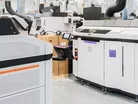HP: Additive Manufacturing Significant to Digitalisation

Conducted by 3dpbm, between March and June 2021, the ‘HP AM Trends in EMEA’ report targets five key markets - France, Germany, Italy, Spain and the United Kingdom (UK).
3D Printing Makes an Impact
According to the latest ‘HP AM Trends in EMEA’, additive manufacturing (3D printing) is playing a significant role in the digitalisation of manufacturing and the disruption of industries. 96% agree that additive manufacturing helps them to get products to market faster, with 100% recognising the importance of increasingly digitising their production workflows, with on-demand production of parts being a key driver.
Also identified in the report, 63% of European parts manufacturers will invest between €100,000 and over €1mn in digitalisation over the next 12 months due to the agile ecosystem and technological capabilities it can provide.
“A digital transformation of manufacturing is underway. The leading companies of the future will be those that harness the power of software, data, AI, and digital manufacturing to reinvent and personalise customer products and experiences. Great progress has been made over the last few years, with our HP Multi Jet Fusion technology delivering more than 60 million 3D printed parts since its inception. The need for this technology has increased exponentially over the last 15 months,” said Guyante Sanmartin, Global Head & General Manager, HP 3D Printing Multi Jet Fusion Business.
Sustainable Manufacturing
One influencer on the decision to digitalise operations for manufacturers is sustainability, with 61% of respondents agreeing that it is a relevant factor driving digitalisation.
In addition to sustainability, 91% reported producing parts on-demand was a significant benefit, alongside 79% who believe it helps to mitigate production challenges such as adapting to fluctuating demands.
“The advanced capabilities of 3D printing are creating entirely new opportunities for disruption across industries and with a far more environmentally sustainable approach, which is a significant driver for manufacturers today. For 50% of UK manufacturers, sustainability is a key factor in the decision to digitalise, who are recognising that 3D printing and its intrinsically flexible nature can empower a more circular economy,” said Dave Prezzano, Managing Director, UK&I, HP Inc.
Digital Transformation in Manufacturing
In addition to sustainability, the report identified that additive manufacturing provides manufacturers with key opportunities to digitalise their processes. Digitalisation is also considered a necessity for almost the entire manufacturing process by 96% of respondents.
For industrial parts manufacturers, additive manufacturing was identified as key to producing more cost-effective components, as well as improving product quality and production speed.
Among those in Europe, the UK and Germany are planning the most significant investments in digitalisation and additive manufacturing with 50% and 40%, respectively, intending to investing more than €1mn in the next five years.
Other findings From the Report
- 83% of survey respondents use additive manufacturing for the production of components and tools to make commercial products, 52% already make complete finished products using additive manufacturing
- British industrial parts manufacturers are planning the most significant investment in digitalisation and additive manufacturing, 50% intend to spend over €1mn in the next five years
- 100% of UK respondents show high confidence in the growth of additive manufacturing, and expect extreme growth
- British industrial parts manufacturers identified on-demand production (33%), and the ability to make parts that can’t be made with traditional processes (34%) as key drivers for adopting digitalisation, with 50% highlight production flexibility as the main benefit of the technology
"We mainly focus on low volume batch production of engineering parts and we produce as many as 750,000 parts per year,” said Nick Allen, Managing Director of 3DPRINTUK, one of the British industrial parts manufacturers that took part in the survey.
“We've seen an average growth of 32% over the past few years and we are projecting 55% growth in 2021. The trend towards using additive manufacturing for production is ever-increasing: we have watched the industry evolve over the last 10 years. When we started, we were producing 90% prototypes but now we’re producing around 90% end-use parts. More and more companies are adopting additive into their products and I see no reason for that growth to slow. We, for one, have doubled our capacity over the past 12 months and are looking to further increase it over the coming 12 months.”

